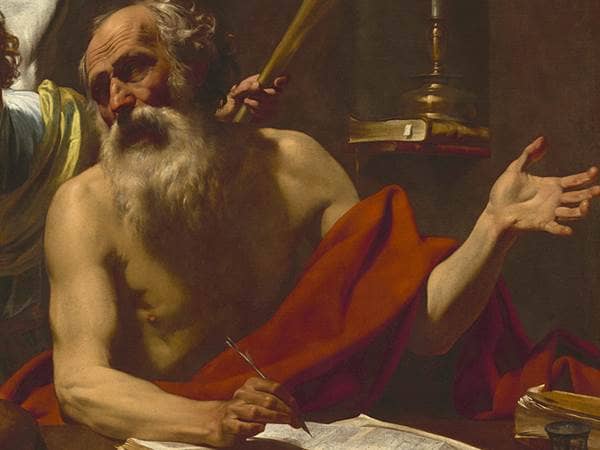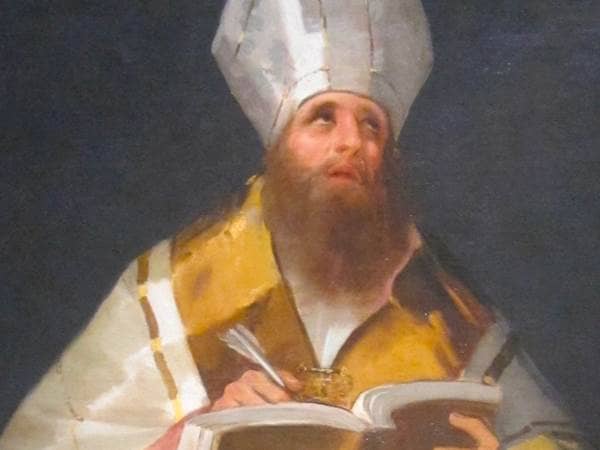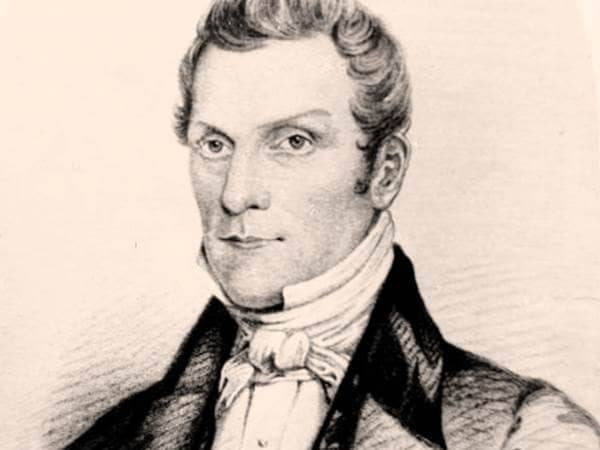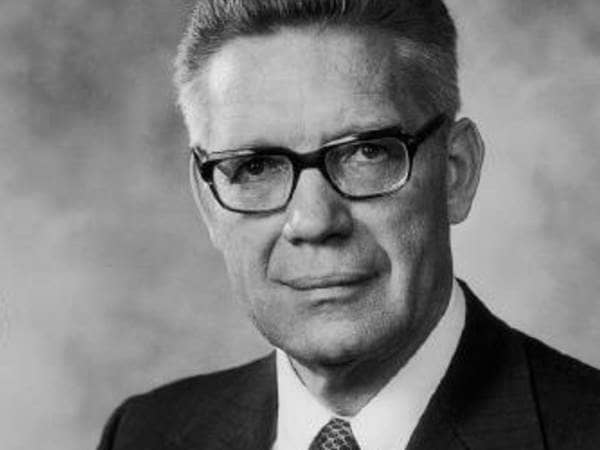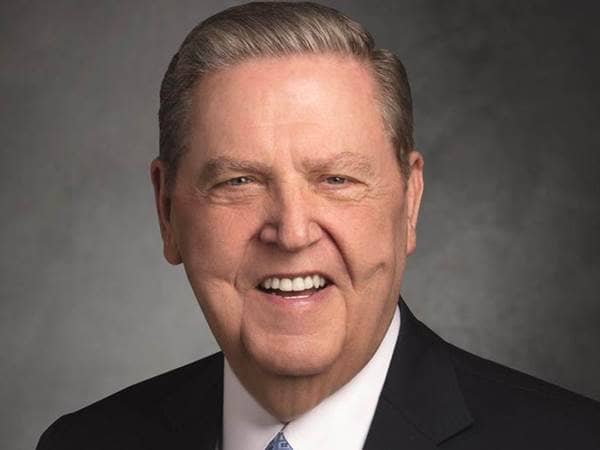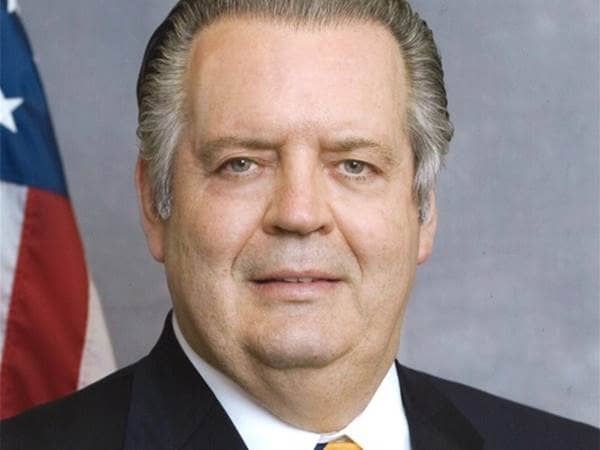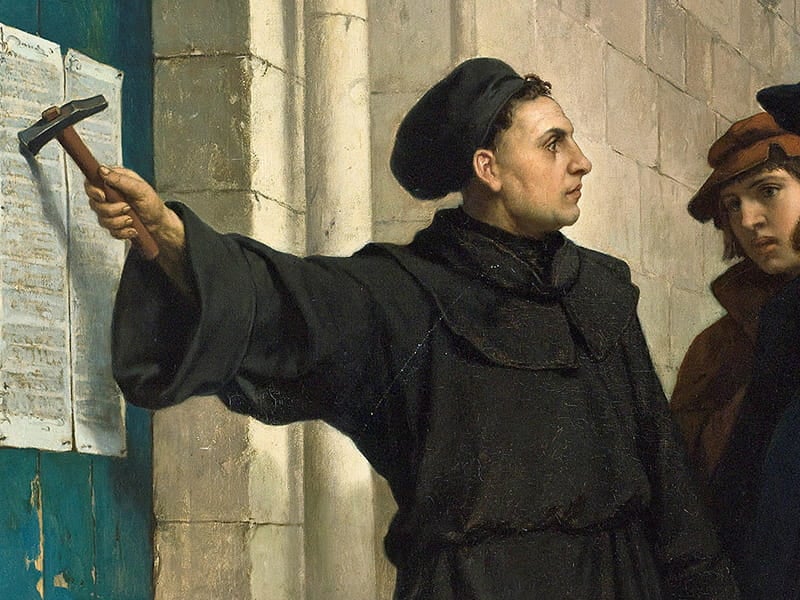
- Profession: Monk
- Lived: November 10, 1483 - February 18, 1546 (Reformation)
- Nationality: Mansfeld (present-day Germany)
- Known for: Luther's challenge to church corruption instigated the Reformation
- Fun Fact: Luther never intended to cause a schism. A devout Catholic monk, his goal was to reform the Church away from its corrupt ways.
- Fun Fact: Luther was famous for his colorful insults (many of them unprintable here.) Here's one aimed at the pope: "“May God punish you, I say, you shameless, barefaced liar, devil’s mouthpiece, who dares to spit out, before God, before all the angels, before the dear sun, before all the world, your devil’s filth."
Martin Luther was an Augustinian Catholic monk who loved the faith. He never intended to cause a schism—his goal was to move the Church away from corrupt practices. If Catholic authorities had responded more quickly and reasonably to Luther’s complaints, the reforms may have happened within Catholicism. But they did not, and schism it was—his 99 Theses in 1517 is considered the beginning of the Protestant reformation.
Born in 1483 in Eisleben, Mansfeld (an area now part of Germany), Luther’s father owned copper mines and was a town council member. In college, Luther rejected the law for being unconcerned with truth, and philosophy for being too focused on reason rather than truth. He entered an Augustinian monastery at 21 and several years later was invited to join the new University of Wittenberg, where got his doctorate and eventually chaired the theology department; he became vicar of all Augustinian monasteries in Saxony. Luther was deeply troubled by the aggressive selling of indulgences (cash donations to speed a dead relative through purgatory to heaven) to the poor in his region in order to fund the construction of the magnificent St. Peter’s in Rome. He wrote a letter of complaint to the bishop, emphasizing that salvation comes from God through grace, and therefore cannot be bought, and cannot be granted by church officials. This may have been the end of it, except that it coincided with the new widespread distribution of printing presses. Copies of Luther’s complain letter were translated and printed throughout Europe within months. Eventually, Luther was tried for heresy; untethered now and oppositional, Luther started finding other disagreements, including challenging the pope’s authority to interpret scripture. The pope issues a document ordering Luther to recant, which Luther publicly burned. He was excommunicated and at after refusing to recant at Worms, charged with heresy. Luther had powerful friends however, and they helped him escape and protected him as he continued to write—challenging the legitimacy of monastic orders (he, an ex-monk, married an ex-nun, helping legitimize married clergy in the emerging Protestant movement), compulsory confession, and private mass (a common practice of the wealthy), translating both the Bible and parts of the liturgy into German, and eventually linking the papacy to prophesies of the antichrist. All was published and distributed widely.
Other reformers started entering the picture, advocating much more radical changes, including adult “re-baptism,” the abandonment of liturgy, and views on equality under God that riled up the masses against the power structures of the time. Luther’s wealthy friends, and his own desire to keep the faith closer to Catholicism (especially in not abandoning the Catholic understanding and practice of Communion), led him to fight against these reformers, and even sanction violent suppression of peasant revolts. But the cat was out of the bag, and reform leaders with various agendas went in all sorts of directions.
Luther’s most famous stain is his anti-Semitism. Though his views were typical for the time (Jews had been expelled from the region in which he lived), Luther elaborated theological justifications for condemning Jews as enemies, and with his blunt way of writing, sanctioned violence against them, laying the groundwork for centuries of open anti-Semitism in Germany. Nazis grounded their anti-Jewish messages with quotes from Luther.
He didn’t mean to start the Reformation, and he was colorful, sometimes ornery to the point of hateful, but Martin Luther’s smart and thoughtful takedown of church corruption and practices ignited the most significant religious shift of the last millennium. Protestant sectarianism has been expanding/unravelling for the last 500 years and some believe it has run its course and that a new phase is beginning. What shape that will take, we won’t know until we’re a bit further into it.
(By the way, the Counter-Reformation finally did start within the Catholic church about 30 years later, including proper theological instruction of priests, cleaning up corruption, and new theological movements. Unfortunately, it also included religious wars and the inquisition that denounced Copernicus and Galileo.)
Born in 1483 in Eisleben, Mansfeld (an area now part of Germany), Luther’s father owned copper mines and was a town council member. In college, Luther rejected the law for being unconcerned with truth, and philosophy for being too focused on reason rather than truth. He entered an Augustinian monastery at 21 and several years later was invited to join the new University of Wittenberg, where got his doctorate and eventually chaired the theology department; he became vicar of all Augustinian monasteries in Saxony. Luther was deeply troubled by the aggressive selling of indulgences (cash donations to speed a dead relative through purgatory to heaven) to the poor in his region in order to fund the construction of the magnificent St. Peter’s in Rome. He wrote a letter of complaint to the bishop, emphasizing that salvation comes from God through grace, and therefore cannot be bought, and cannot be granted by church officials. This may have been the end of it, except that it coincided with the new widespread distribution of printing presses. Copies of Luther’s complain letter were translated and printed throughout Europe within months. Eventually, Luther was tried for heresy; untethered now and oppositional, Luther started finding other disagreements, including challenging the pope’s authority to interpret scripture. The pope issues a document ordering Luther to recant, which Luther publicly burned. He was excommunicated and at after refusing to recant at Worms, charged with heresy. Luther had powerful friends however, and they helped him escape and protected him as he continued to write—challenging the legitimacy of monastic orders (he, an ex-monk, married an ex-nun, helping legitimize married clergy in the emerging Protestant movement), compulsory confession, and private mass (a common practice of the wealthy), translating both the Bible and parts of the liturgy into German, and eventually linking the papacy to prophesies of the antichrist. All was published and distributed widely.
Other reformers started entering the picture, advocating much more radical changes, including adult “re-baptism,” the abandonment of liturgy, and views on equality under God that riled up the masses against the power structures of the time. Luther’s wealthy friends, and his own desire to keep the faith closer to Catholicism (especially in not abandoning the Catholic understanding and practice of Communion), led him to fight against these reformers, and even sanction violent suppression of peasant revolts. But the cat was out of the bag, and reform leaders with various agendas went in all sorts of directions.
Luther’s most famous stain is his anti-Semitism. Though his views were typical for the time (Jews had been expelled from the region in which he lived), Luther elaborated theological justifications for condemning Jews as enemies, and with his blunt way of writing, sanctioned violence against them, laying the groundwork for centuries of open anti-Semitism in Germany. Nazis grounded their anti-Jewish messages with quotes from Luther.
He didn’t mean to start the Reformation, and he was colorful, sometimes ornery to the point of hateful, but Martin Luther’s smart and thoughtful takedown of church corruption and practices ignited the most significant religious shift of the last millennium. Protestant sectarianism has been expanding/unravelling for the last 500 years and some believe it has run its course and that a new phase is beginning. What shape that will take, we won’t know until we’re a bit further into it.
(By the way, the Counter-Reformation finally did start within the Catholic church about 30 years later, including proper theological instruction of priests, cleaning up corruption, and new theological movements. Unfortunately, it also included religious wars and the inquisition that denounced Copernicus and Galileo.)
Back to Search Results
